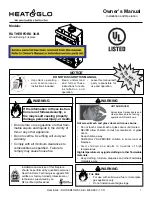
ENGLISH
5.4 FLUE GAS EXHAUST
The stove operates with negative pressure in the
combustion chamber, and consequently the
À
ue
gas discharge must be airtight.
The stove must be connected to its own separate
flue gas exhaust system capable of ensuring
adequate atmospheric dispersion of the combustion
byproducts.
The components making up the
À
ue gas exhaust
system must be suitable for the speci
¿
c operating
conditions and bear the CE mark.
An initial vertical section measuring a minimum of
1.5 metres is required to ensure correct
À
ue gas
exhaust.
There should be at least three changes in direction
along the
À
ue, in addition to the
À
ue connection
at the rear of the stove, using 45 or 90° angle
connectors or ‘T’ connectors.
Use always a ‘T’ connector with inspection cap on
all horizontal or vertical changes in
À
ue direction.
The maximum length of horizontal sections is 2-3
m with an upwards slope of 3-5% (Fig. 5.1).
Anchor the
À
ues to the wall using special collars.
The
À
ue gas exhaust attachment MUST NOT BE
connected to:
-
a chimney used by other heat generators
(boilers, stoves,
¿
replaces, etc.....);
-
air exhaust systems (range hoods, vents,
etc.....) even if these are ducted.
Shut-off or draught valves must not be used.
Combustion byproducts must be discharged
through the roof.
Fig. 5.1
31
















































